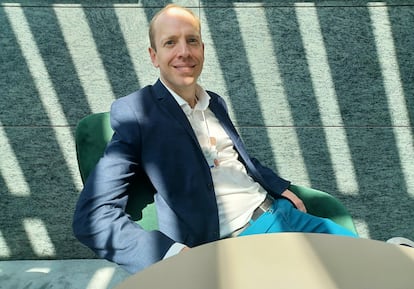Alexander Betts, from the University of Oxford: ‘The principle of asylum is under threat to a greater extent than at any time since WWII’
The director of the Refugee Studies Centre at the British institution warns about the tightening of the migration policies in Europe


In an increasingly conflictive and authoritarian world, the number of people fleeing violence and persecution is growing. Climate change, inequality and other factors spur large exoduses of people who escape from natural catastrophes and misery. Meanwhile, in the advanced democracies, more and more restrictive positions on migration are becoming consolidated. In this scenario, Alexander Betts, director of the Refugee Studies Centre at the University of Oxford, warns that “the principle of asylum is under threat to a greater extent than at any time since the Second World War.” The conversation took place recently in Geneva, in the context of the Growth Summit organized by the World Economic Forum.
Question. In just over a year, Europe has welcomed approximately eight million Ukrainian refugees with some efficiency and without great tension. At the same time, some 300,000 irregular arrivals in the EU in 2022 are enough for some to consider it a crisis. Could there be any symptom of racism behind that difference?
Answer. I think we should celebrate Europe’s response to the Ukraine crisis and recognize the extraordinary wave of humanitarian solidarity. On the other hand, we have to recognize that Europe shows a very different face to asylum seekers and irregular migrants coming from other regions of the world. There is a double standard, and some would say the difference lies in geographical proximity. Of course, we have to open up the doors to those who come from our neighbors. On the other hand, I think there is a lot of truth to the claim that there’s an underlying element of hypocrisy and that the difference is in part explained by race, religion and gender. But across Europe we receive many people who are incontrovertibly refugees from persecuting countries. And yet Europe as a whole is not only failing to provide safe pathways and safe passage for those people to arrive in Europe, but also in many cases is engaging in acts of refoulement, forcibly returning people back, whether from boats or having arrived on land, to countries that are not safe, like Libya. So we see these two sides of the coin and race is at the core of it. Religion is also part of it.
Q. What do you think of the plans of countries like the United Kingdom or Denmark to bounce asylum seekers who arrive in their territory to third countries such as Rwanda?
A. The Rwanda proposal is unworkable, cruel and illegal. It builds on precedents like Australia’s approach to offshoring, processing asylum seekers on the island of Nauru and Papua New Guinea. But it goes a step further. Australia processes asylum claims in Nauru and Papua New Guinea with the intention that those recognized as refugees are ultimately brought back to Australian territory. What’s different about the Rwanda proposal is it takes people who arrive as refugees, denies them access to a legal process to determine whether they’re refugees and sends them on a one way ticket to Rwanda and pays Rwanda to integrate them. In the long term, it is very likely to be incompatible with the international refugee and human rights bill. This is denying people access to the right to seek asylum, which is central to refugee and human rights law. The Home Secretary [Suella Braverman] has said to the media that she dreams of front page news in a national daily, The Daily Telegraph, showing a picture of a plane taking off. In reality, these policies are speaking to domestic political debates.
Q. You point to the British conservative government, but we see that the social democrats in power in Denmark also adopt very restrictive policies. Other parties in the progressive family are toughening up their position on immigration. Do you think we are witnessing a general trend towards the right in addressing these kinds of issues?
A. I think there is a shift to the right on immigration amongst mainstream parties across Europe. In Scandinavia, Denmark is perhaps the most extreme example. Center-left parties across Europe are often in a very difficult position of needing to attract working class voters, and those are groups who often have the most skepticism towards immigration because of the effect that low skilled immigration has on wage levels, house prices and access to public services like education and health services. And increasingly center-left parties stay away from the asylum and immigration debate, leaving the agenda to be determined by the right.

Q. You have referred to return practices, more or less on the spot, that occur in different places. Are these types of actions in accordance with international law?
A. The right to seek asylum is a really important, established principle in international law, going back to the 1951 Convention on the Status of Refugees. The core idea is that all states in the world reciprocally commit to admit refugees onto their territory and allow them to remain until it’s safe for them to go home. If the UK or Denmark say, “we’re not going to take in refugees,” well then why should Kenya? Why should Turkey? The principle of asylum is under threat to a greater extent than at any time since the Second World War. And it’s partly because states are eroding the right to spontaneously seek asylum. There’s a really core principle in refugee law and human rights law of non-refoulement. The idea that you cannot forcibly return someone to a country in which they risk serious harm. What we’ve done in Europe over a long period of time is shift the virtual border away from the physical border. States have realized that if they can impose restrictions and non entry mechanisms that make it more and more difficult to reach the territory of that state, they avoid their obligations under international law, whether that’s posting immigration control officers at the airports or ports of entry of other countries, whether it’s having joint Coast Guard operations or naval operations that restrict the ability to cross territorial water, in order to establish razor wire fences that stop people crossing from Morocco to Spain.
Q. What are the consequences?
A. Extraterritorial control of the border makes spontaneous movement of asylum seekers more and more difficult. Unless you have a visa, you can’t easily get on a plane. What that means is that one of the key actors in asylum are now smuggling networks and criminal gangs, demonized by European politicians in the media. They’ve become the only realistic way in which most refugees can access European territory.
Q. What do you think about the EU’s attempts to set up a new pact on asylum and migration? Do you think it is realistic to expect any significant change in the short and medium term?
A. The Common European Asylum System is broken and needs updating. The Dublin system that underlies it is problematic because it allocates the majority of the responsibility to the frontline countries. It means that if you arrive in Greece or Italy or Spain, those should be the countries that assess your asylum application and take responsibility. It creates a perverse incentive for some of those countries to wave through asylum seekers and turn a blind eye to their movements to other parts of Europe. And through that there’s suspicion and mistrust between Europe. For a long time, we’ve had some very sensible, thoughtful proposals put forward by the European Commission [...] but the politics gets in the way. The Visegrad States [a group made up by Poland, Hungary, the Czech Republic and Slovakia] are in a very different position from the Mediterranean states, which are in a very different position from Western and Northern European states. There needs to be serious, concerted leadership in order to get collective action.
Q. Many European countries are suffering severe demographic declines, and orderly economic immigration is part of the solution. Germany, for example, is taking steps in that direction, but in many other cases large movements have not been detected. Do you think there will be progress in this segment, or will we continue to be trapped in restrictive logic?
A. It’s very clear that Europe needs workers. Demographics and an aging population mean that we need to import labor in order to address that imbalance. And we know that everybody benefits from high skilled migration, and low skilled migration massively benefits businesses, but it has redistributive consequences by putting downward pressure on wages, upward pressure on house prices. But in aggregate, everyone benefits from low skilled labor migration. What we have to do is persuade the public to recognize that there are these labor migration needs and that our economies will benefit, and in the long term that will grow the economic pie for the benefit of everyone.
Sign up for our weekly newsletter to get more English-language news coverage from EL PAÍS USA Edition
Tu suscripción se está usando en otro dispositivo
¿Quieres añadir otro usuario a tu suscripción?
Si continúas leyendo en este dispositivo, no se podrá leer en el otro.
FlechaTu suscripción se está usando en otro dispositivo y solo puedes acceder a EL PAÍS desde un dispositivo a la vez.
Si quieres compartir tu cuenta, cambia tu suscripción a la modalidad Premium, así podrás añadir otro usuario. Cada uno accederá con su propia cuenta de email, lo que os permitirá personalizar vuestra experiencia en EL PAÍS.
¿Tienes una suscripción de empresa? Accede aquí para contratar más cuentas.
En el caso de no saber quién está usando tu cuenta, te recomendamos cambiar tu contraseña aquí.
Si decides continuar compartiendo tu cuenta, este mensaje se mostrará en tu dispositivo y en el de la otra persona que está usando tu cuenta de forma indefinida, afectando a tu experiencia de lectura. Puedes consultar aquí los términos y condiciones de la suscripción digital.








































